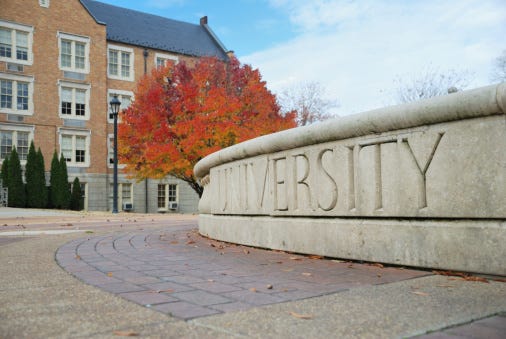For the first time, the cost of higher education is rising above inflation at roughly 2–3% each year. With December’s inflation report at 7%, the highest in nearly 40 years since 1982, every financial decision must be weighed at a higher cost.
As a student attending a private university in one of the most expensive cities in the world, I was extremely fortunate to receive a free 4-year ride to college. You can read all the details here. I saved more than a quarter of a million dollars due to luck and timing.
Saving 4 years of tuition back into my pocket is not only a massive lift off my shoulders but with this opportunity, I feel the urgency to help others who don’t have the means to obtain an incredible life-changing education at an elite university, let alone free tuition through a scholarship.
No one should sacrifice bread and butter to obtain a degree yet millions pursue the path each year to increase certainty with a larger payout and higher position on the income ladder past graduation. Research proves that a higher education background and experience leads to greater earned income potential and more opportunities down the line but it is always crucial to remember, what you put in is what you get out.
Part of my work on campus is advocating and promoting financial literacy to break the gender, pay, wealth, and inequality gap that persists in the world of personal finance. It’s unfortunate the dated system of institutionalized education does not reflect the changing climate all that much. Alongside healthcare, a $4 trillion dollar industry that still requires a patient to take an hour or more out of their day to confirm with their doctor they don’t feel good, automation, mobility, and accessibility need to be installed and dispersed. Thankfully due to the pandemic, telehealth platforms have become more mainstream and many without the means or time to navigate this complex system could all just get it all done at home.
Sure we have robotics, budgeting, and computer science courses taught in primary school, but what about AI, VR, the stock market, or portfolio allocation? It may be too early to learn derivates, but never investing. The taboo on money must be banished and it’s frustrating to hear students tell themselves they will get around to controlling their finances, massive student loan debt, refinancing a mortgage, and taking out more loans for a house, car, additional education later on.
When is later? Exactly.
Learning the foundation of personal finance is crucial regardless of what you study in school or what industry you end up working in. Despite or because of the pandemic, the retail trading meme short squeeze frenzy at the start of January 2021 lead to an unprecedented surge of new traders with millions of opened accounts. Yet this is not the type of investing I am referring to. This is called speculative, technical day trading gambling.
I advocate and recommend as a passive investor myself, long-term goal-oriented value and fundamental investing for students. This will set them up on a prudent path towards financial freedom and security. This is my goal since I was given the opportunity to not have to get into debt or tap into my 529 college savings. For comparison, the U.S., the median home price is ~$360k. Behind the purchase of a primary residence, the second largest purchase an American will ever make in their lives is for education expenses. Preparing for this rising expense by starting as early as possible is the most advantageous for tax and mental reasons.
No wonder people in the Nordic countries are blissful, eager, and excited to explore the world. They get free education! In America, everyone is fending for themselves and has to pay for health, dental, home, life insurance, education, child care, and several large employers such as Amazon now cut down their paid-time sick leave as the quarantine isolation period shrank from 10 to 5 days. These subsidized benefits including insurance, PTO, max contributions to a tax-advantaged retirement account, severance package, and arguably more stability are one of the top benefits of working for a company versus going solo. If you plan on working for one, obtaining a degree, an economic premium, is highly advised and necessary otherwise, if you can, still get it no matter where you choose to venture off to. Education is one of the few things in life that CANNOT be taken away from you. Learn and invest continuously even beyond the classroom for extra dividends.
In 2021, the national average work hours per week went down to ~40. Yet Americans are notorious for not taking time off. For some reason, it’s seen as a badge of honor not to use PTO. We are finally learning from advanced rested natives such as the Danes and Swedes who work only an average of ~40 hours per week. I guess all it takes is 50 hours per week to crush it and accelerate our potential? Nevertheless, working smarter not harder and quality > quantity matters most. Focus on results not the number of hours worked for the ultimate reward.
Lately, I’ve been speaking to students about their frustrations with their student loans. Thankfully there’s been national emergency relief during the pandemic. With current rock bottom interest rates, if you haven’t gotten a chance to budget and pay off those pesky loans in full or consolidate, I would advise doing so before the Fed pushes the breaks on QE.
Federal student aid forgiveness is expected to reach hundreds of thousands of students. 42.9 million Americans currently hold student loans which is a total of a staggering $1.57 trillion averaging an individual amount of $36,510.
Thankfully, Navient — one of the largest student loan servicers — will be required to cancel $1.7 billion in private student loans for ~66,000 borrowers.
Compared to the student loan amount, credit card debt data from the Federal Reserve Bank of New York stands at ~$804 billion. This indicates Americans at least are spending more on appreciable assets such as a degree and taking on ‘good’ debt as opposed to ‘toxic’ debt on items such as furniture, clothing, accessories, cars, etc.

Pressurized Factors
Lately, across the country, more than ever I’ve been hearing students express their frustration around the cost versus benefit of remote school. No one anticipated a remote environment would last this long with variants popping up every few months but institutions a.k.a companies have the opportunity to alleviate the burden by providing students what they really want which is a more reasonable Zoom-adjusted cost and more stipends, scholarships, or subsidies. Remote school can never replace in-person and as a student, studying on campus is your ultimate goal and the main reason for attending in the first place. Not since the Great Depression has there been more 18–35-year-olds living at home.
As a 3rd year student myself having gone remote now for 2 ½ years, three-quarters of my time spent on campus since freshman year, I sympathize with those who don’t feel they are getting what they wanted out of college. I believe the real experience is achieved in-person which involves initiating conversations, enriching networks, joining clubs, meeting new people, enjoying the presence and comradery of campus life, visiting new places on campus and in the Big Apple, and most importantly soaking up these precious moments as a student while they last.
The pandemic has taken a toll on everyone, especially younger generations who need an in-person connection to learn people and social skills. Primary school students are a few months behind in core subjects such as reading and math and teens are struggling with two pandemics, a mental health crisis, and a virus.
Although we can thank the ubiquity of social media in this day in age, I still feel isolated and feel empty without being on campus as a student. I know I won’t get these precious moments back and the least a school could do for others is to lower the price of Zoom school. According to data nationwide and internationally, students have emphasized this feeling of regret and millions have decided to depart or in preparation for going to college,e have decided to flock on a gap year or start building their reputation and a living for themselves online. In that aspect, it certainly couldn’t be a more opportune time to divert and follow the surge of the Great Resignation and start paying off debt in this low-interest-rate environment, building home equity if you can afford it in this heated low inventory rapid market, and build side hustles or freelancing gigs or intellectual property by starting a blog like this one, a YoutTube channel, rent out your apartment or turn it into an Airbnb, and invest in yourself and in the markets. Continuously. I would urge full-time college students to do this continuously.

School’s Out?
New enrollment data from the National Student Clearinghouse Research Center found that 1.2 million fewer students are enrolled in US colleges today compared to Fall 2019.
In 2021, Fall enrollment fell 3.1% from the previous year, according to the research. Combined with the 2020 enrollment drop, this brings the total decline since Fall 2019 to 6.6%. This is the largest 2-year decrease in more than 50 years!
Let’s examine which higher-ed sectors have slumped the most:
-Associate degree seekers dropped 6.2% in 2021, and 14.1% over the last two years.
-Community colleges have lost around 15% of students since 2019.
-Liberal arts fell off the hardest, declining 7.6% this year.
As they say, passions don’t always pay the bills.
Doing what you love can be challenging since it may not be realistic. Yet in order to enjoy life and live to the fullest, you must determine how you can balance it all which starts with never relying on one income source, taking time to invest in yourself in the markets, and diversifying your income streams to have more cash flow left on hand to reinvest. Strive to invest at least 30% of your take-home gross pay for ultimate freedom. When it comes to a business, since expenses are tax-deductible and you can determine how much you want to reinvest back into your own business that is your net-worth behind locked doors not usually spent, there are even more tax advantageous opportunities for you here. It’s not impossible to become a millionare by aggressively saving and investing but much easier with intellectual property, a tangible asset such as real estate or reinvested passive investment income.
Once your net worth is 20–30x your gross income, you will be able to manage your passions and streamline your goals better with a financial buffer on hand.

Target List
The Great Resignation is a prominent force that has lead students to think hard about their career aspirations as much as adults. After all, the demographic that benefits the most from the Great Resignation are teens who obtain lower-wage part-time jobs that happen to be short on staff.
Lately I’ve found in the roles designed for college students, they’ve been much more eager to negotiate pay, ask for fewer hours, and even a fully-remote option. I believe as long as you can get the work done and make sure you are engaging with your team mates proactively and on a regular basis, then you should be able to design your life and schedule as you should.
For the last decade, college enrollment has been dropping but lately the “Covid gap year” has been the primary driver for this steep decline. Everyone needs a break but at the same time, what do you do during a pandemic gap year? Sleep more? Taking advantage of freelancing gigs, entrepreneurship boom, investing, and side-hustles would have been more beneficial. Over 5.2 million businesses were started in the last year alone.
It’s important to note not all students have the luxury of choosing whether or not they want to go to school for parental and or cost reasons. According to studies, white male men are most likely to drop out of college or not pursue an higher-ed due the concept of risk aversion and aggression. Men tend to be less risk averse and choose to leverage themselves and their careers more.
This is an example of the hidden gender discrimination engrained in the social fabric of our lives. From the pink tax to the invisible glass door, men have more availability when it comes to career options yet luckily, there are more women graduates than men! According to Pew Research, young women are more likely to be enrolled in college today than young men as of spring 2021, women made up 59.5% of U.S. college graduates, this is an all-time high.
Due to the pandemic and new style of learning and working, enrollment may not be the issue, but competition with underlying costs are the main drivers.
Since the late 1960s into early 1970s, women’s expectations of their roles in the workforce changed; backing away from traditional occupations and more into STEM courses and employment outside of home.
This lead the gender shift to occur and college graduates’ first marriage increased by 2.5 years in the 1970s along with steadier pofesional careers and greater investment in the resurgence of feminism. This influence has carried on and multiplied today with the rise of women’s rights in working for themselves, taking on more positions in top management at companies, and being the working parent with their partner at home.
Interestingly enough, although college attendance for men and women was nearly six-times higher in the 1980s than in the 1920s and even wider than it is today, the confluence of the gender imbalance, behavioral favors, the meaning of college, and comparison to being a student of life not school, learning outside of the classroom, evaluating the stability and guarantee of a degree, and the dispersion of technology, venture capital funding, IPO and SPAC market craze illustrating a visionary look into becoming the next Zuckerberg, and the Great Resignation have all fueled a resignation even amongst students not just employment.
No matter where you decide to educate yourself, remember, nothing is guaranteed.
You have to put in the work for the work to work for you. A degree won’t guarantee anything — it simply acts as a stabilizer and achievemnet you can fall back on to show credibility, grit, determination, and diligence within a system. If you have the time and means, beyond the classroom continuously invest in yourself on the side for extra insight and experience.

